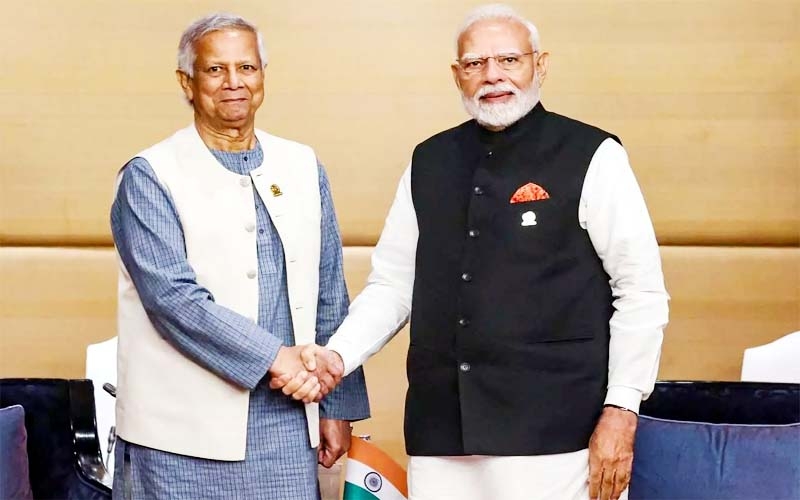- Intimidation or bloodshed cannot halt Bangladesh’s march to democracy |
- Khaleda Zia integral to an important chapter in BD history: Yunus |
- Enthusiasm marks Victory Day celebrations across Bangladesh |
- Dhaka-Delhi ties deep; to be shaped by trust, dignity, mutual respect |
- EU deploys election observation mission to Bangladesh |
Modi-Yunus Talks to Boost Dhaka-New Delhi Ties

Relations between Dhaka and New Delhi, which have been under strain since the August 2024 ousting of former Prime Minister Sheikh Hasina, are expected to take a positive turn after an upcoming meeting between Bangladesh's Chief Adviser Dr. Muhammad Yunus and Indian Prime Minister Narendra Modi. The meeting is set to take place on the sidelines of the 6th BIMSTEC Summit in Bangkok on April 4, 2025, and is expected to serve as a critical step in revitalizing the bilateral ties between the two neighboring countries.
The political upheaval in Bangladesh, resulting in Hasina's departure from office, had put a halt to the positive momentum in Dhaka-New Delhi relations. Diplomats, policymakers, and business leaders in both capitals have pointed out that political and security concerns have overshadowed economic and social cooperation in recent months. Key issues such as border security, water sharing from the 54 rivers, and minority rights have remained sources of friction between the two nations since the leadership change in Bangladesh.
India’s expectations are primarily centered on securing the protection of Hindu communities in Bangladesh, promoting Indian investments, and ensuring smooth transit to India’s northeastern states through Bangladesh. Furthermore, India seeks to limit the influence of religious groups and reduce tensions with neighboring Pakistan and China. Bangladesh, on the other hand, is keen to address critical issues like equitable water distribution, halting border killings, restoring visa issuance processes to previous levels, and countering anti-Bangladesh propaganda in India.
Sources suggest that both leaders are likely to show a positive stance during the meeting, despite the relatively brief duration of the discussion, which is expected to last no more than 30 minutes. The meeting will provide an opportunity to set the tone for future cooperation, and the leaders may also discuss specific regional concerns that affect both nations. The agenda is believed to include discussions on improving transit access, addressing visa issues, and resolving long-standing security concerns.
In addition to his meeting with Modi, Chief Adviser Yunus will hold bilateral discussions with other leaders at the BIMSTEC summit, which will focus on regional peace and development. Bangladesh is also looking to use its chairmanship of BIMSTEC for the next two years to advance multilateral cooperation and foster stronger ties within the Bay of Bengal region.
India’s Defense Minister Rajnath Singh recently reaffirmed India’s commitment to maintaining strong ties with Bangladesh, emphasizing the importance of regional cooperation and good relations with neighboring countries. His statement underscores India’s ongoing interest in rebuilding its relationship with Bangladesh, despite the current political shifts.
The summit in Bangkok, which follows the virtual 5th BIMSTEC summit held in 2022, is seen as a crucial moment for both countries. With the theme of the summit centered around creating a "Prosperous, Resilient, and Open BIMSTEC," both leaders will likely use the platform to address regional cooperation issues, including trade, connectivity, and security. A major focus of the discussions is expected to be on the establishment of new initiatives to promote economic cooperation and ensure mutual benefits for all member countries.
In a further development, India’s Foreign Secretary, Vikram Misri, and Bangladesh’s Foreign Secretary, Md. Jashim Uddin, have been working together to resolve ongoing visa complications that have affected the travel of Bangladeshi citizens to India, particularly those seeking medical treatment. Since the political changes in Bangladesh, India has imposed strict visa regulations, citing national security concerns. However, both sides are hopeful that the summit could lead to a resolution and a return to normal visa operations.
The strained relationship between India and Bangladesh has had tangible effects on people-to-people exchanges, with a notable decline in the number of Bangladeshi tourists visiting India in recent months. According to reports from India’s Tourism Board, the number of Bangladeshi tourists visiting India in 2024 dropped by 20 percent compared to the previous year, reflecting the broader political tensions between the two nations.
Despite these challenges, there is optimism that the upcoming meeting between Modi and Yunus could pave the way for future engagements. The political changes in Bangladesh present an opportunity for both countries to reassess their bilateral relationship and prioritize cooperation on regional issues that affect both nations.
The potential invitation for Dr. Yunus to visit India in the future would signal a thaw in relations, encouraging further collaboration on issues like transit to Nepal and Bhutan, water resource management, and border security. This visit would not only strengthen the diplomatic ties between Dhaka and New Delhi but also serve as a model for cooperation within the BIMSTEC framework.
As the summit draws near, officials from both countries are working hard to ensure that this crucial diplomatic opportunity is used to rebuild trust and explore new avenues for collaboration, particularly in areas that have long been of mutual concern. The hope is that the meeting between Modi and Yunus will mark the beginning of a new chapter in Dhaka-New Delhi relations, with both leaders committed to overcoming past differences and working towards a prosperous and peaceful future for both nations and the wider South Asian region.

